Related Research Articles

Sir David Lean was an English film director, producer, screenwriter and editor. Widely considered one of the most influential directors of all time, Lean directed the large-scale epics The Bridge on the River Kwai (1957), Lawrence of Arabia (1962), Doctor Zhivago (1965), and A Passage to India (1984). He also directed two adaptations of Charles Dickens novels, Great Expectations (1946) and Oliver Twist (1948), as well as the romantic drama Brief Encounter (1945).

Oliver! is a British musical, with book, music and lyrics by Lionel Bart. The musical is based upon the 1838 novel Oliver Twist by Charles Dickens.

Oliver Twist; or, the Parish Boy's Progress is Charles Dickens's second novel, and was published as a serial from 1837 to 1839 and released as a three-volume book in 1838, before the serialisation ended. The story centres on orphan Oliver Twist, born in a workhouse and sold into apprenticeship with an undertaker. After escaping, Oliver travels to London, where he meets the "Artful Dodger", a member of a gang of juvenile pickpockets led by the elderly criminal Fagin.

Valerie Hobson was an Irish-born actress who appeared in a number of films during the 1930s, 1940s and 1950s. Her second husband was John Profumo, a government minister who became the subject of a sensational sex scandal in 1963.

Jack Dawkins, better known as the Artful Dodger, is a character in Charles Dickens' 1838 novel Oliver Twist. The Dodger is a pickpocket, so called for his skill and cunning in that occupation. He is the leader of the gang of child criminals, trained by the elderly Fagin.
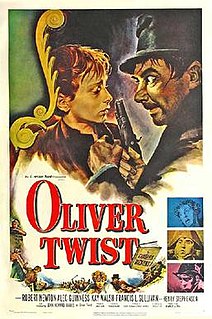
Oliver Twist is a 1948 British film and the second of David Lean's two film adaptations of Charles Dickens novels. Following his 1946 version of Great Expectations, Lean re-assembled much of the same team for his adaptation of Dickens' 1838 novel, including producers Ronald Neame and Anthony Havelock-Allan, cinematographer Guy Green, designer John Bryan and editor Jack Harris. Lean's then-wife, Kay Walsh, who had collaborated on the screenplay for Great Expectations, played the role of Nancy. John Howard Davies was cast as Oliver, while Alec Guinness portrayed Fagin and Robert Newton played Bill Sykes.
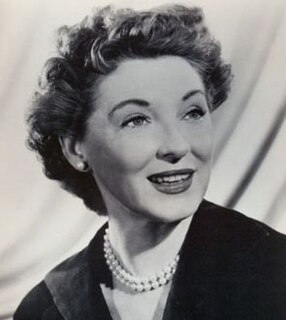
Kathleen "Kay" Walsh was an English actress, dancer, and screenwriter. Her film career prospered after she met her future husband film director David Lean, with whom she worked on prestige productions such as In Which We Serve and Oliver Twist.
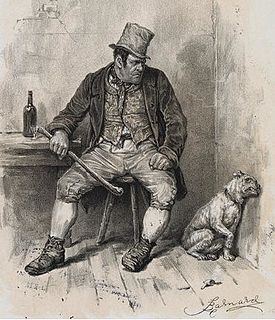
William Sikes is a fictional character and a main antagonist in the 1838 novel Oliver Twist by Charles Dickens. Sikes is a malicious criminal in Fagin's gang, and a vicious robber and murderer. Throughout much of the novel Sikes is shadowed by his “bull-terrier” dog Bull's-eye.
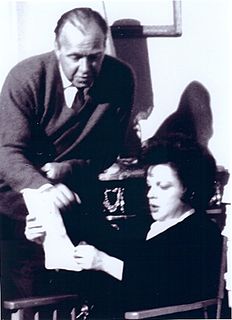
Ronald Neame CBE, BSC was an English film producer, director, cinematographer, and screenwriter. Beginning his career as a cinematographer, for his work on the British war film One of Our Aircraft Is Missing (1943) he received an Academy Award nomination for Best Special Effects. During a partnership with director David Lean, he produced Brief Encounter (1945), Great Expectations (1946), and Oliver Twist (1948), receiving two Academy Award nominations for writing.
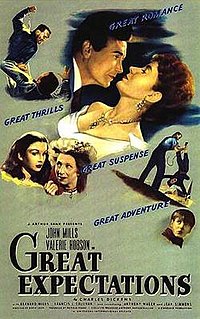
Great Expectations is a 1946 British film directed by David Lean, based on the 1861 novel by Charles Dickens and starring John Mills and Valerie Hobson. The supporting cast included Bernard Miles, Francis L. Sullivan, Anthony Wager, Jean Simmons, Finlay Currie, Martita Hunt and Alec Guinness. John Bryan and Wilfred Shingleton won the Best Art Direction, Black-and-White, while Guy Green won for Best Cinematography, Black-and-White. Lean was nominated for Best Director, Lean, Ronald Neame and Anthony Havelock-Allan for Best Screenplay and the film for Best Picture.

Guy Mervin Charles Green OBE BSC (5 November 1913 – 15 September 2005) was an English film director, producer, screenwriter, and cinematographer. In 1946, he won an Oscar as cinematographer for the film Great Expectations. In 2002, Green was given a Lifetime Achievement Award by the BAFTA, and, in 2004, he was named an Officer of the Order of the British Empire for his lifetime contributions to British cinema.
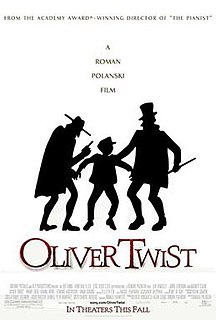
Oliver Twist is a 2005 drama film directed by Roman Polanski. The screenplay by Ronald Harwood adapts Charles Dickens's 1838 novel of the same name. It is an international co-production of the United Kingdom, the Czech Republic, France and Italy.
Sir Anthony James Allan Havelock-Allan, 4th Baronet was a British film producer and screenwriter whose credits included This Happy Breed, Blithe Spirit, Great Expectations, Oliver Twist, the 1968 version of Romeo and Juliet and Ryan's Daughter.

Charley Bates is a supporting character in the Charles Dickens's 1838 novel Oliver Twist. He is a young boy and member of Fagin's gang of pickpockets, and sidekick to the Artful Dodger, whose skills he admires unreservedly. Sikes's murder of Nancy shocks him so much that at the end of the novel he leaves London to become an agricultural labourer.

Fagin is a fictional character in Charles Dickens' 1838 novel Oliver Twist. In the preface to the novel, he is described as a "receiver of stolen goods". He is the leader of a group of children whom he teaches to make their livings by pickpocketing and other criminal activities, in exchange for shelter. A distinguishing trait is his constant—and insincere—use of the phrase "my dear" when addressing others. At the time of the novel, he is said by another character, Monks, to have already made criminals out of "scores" of children. Nancy, who is the lover of Bill Sikes, is confirmed to be Fagin's former pupil.
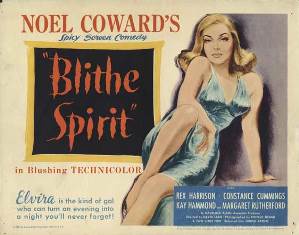
Blithe Spirit is a 1945 British fantasy-comedy film directed by David Lean. The screenplay by Lean, cinematographer Ronald Neame and associate producer Anthony Havelock-Allan is based on producer Noël Coward's 1941 play of the same name, the title of which is derived from the line "Hail to thee, blithe Spirit! Bird thou never wert" in the poem "To a Skylark" by Percy Bysshe Shelley.

Oliver Twist is a 2007 British television adaptation of Charles Dickens' 1838 novel Oliver Twist, written by Sarah Phelps and directed by Coky Giedroyc. It consists of five episodes, broadcast on BBC One from 18 to 22 December 2007. It aired on PBS' Masterpiece Classic in the United States on 15 and 22 February 2009, in two ninety-minute installments. In Australia, ABC1 also opted to air this series as a two-part special each Sunday at 8:30 pm from 20 December 2009.

Edward "Monks" Leeford is a character in the 1838 novel Oliver Twist by Charles Dickens. He is actually the criminally-inclined half-brother of Oliver Twist, but he hides his identity. Monks' parents separated when he was a child, and his father had a relationship with a young woman, Agnes Fleming. This resulted in Agnes' pregnancy. She died in childbirth after giving birth to the baby that would be named Oliver Twist.

Sir Alec Guinness was an English actor. After an early career on the stage, Guinness was featured in several of the Ealing Comedies, including Kind Hearts and Coronets (1949), in which he played nine different characters, The Lavender Hill Mob (1951), for which he received his first Academy Award nomination, and The Ladykillers (1955). He collaborated six times with director David Lean: Herbert Pocket in Great Expectations (1946), Fagin in Oliver Twist (1948), Col. Nicholson in The Bridge on the River Kwai, Prince Faisal in Lawrence of Arabia (1962), General Yevgraf Zhivago in Doctor Zhivago (1965), and Professor Godbole in A Passage to India (1984). In 1970 he played Jacob Marley's ghost in Ronald Neame's Scrooge. He also portrayed Obi-Wan Kenobi in George Lucas's original Star Wars trilogy; for the original 1977 film, he was nominated for Best Supporting Actor at the 50th Academy Awards.
The topic of racism in the work of Charles Dickens has been discussed in scholarly circles, increasingly so in the 20th and 21st centuries. While Dickens was known to be highly sympathetic to the plight of the poor and disadvantaged in British society, like many other authors of the period he expressed attitudes which have been interpreted as racist and xenophobic in his journalism and works. Dickens frequently defended the privileges held by Europeans in overseas colonies and was dismissive of what he termed "primitive" cultures. The Oxford Dictionary of English Literature describes Dickens as a nationalist who frequently stigmatised non-European cultures.
References
- ↑ Cineguild Productions at BFI Screenonline
- ↑ ""JUNIOR ANGEL" AS FILM OLIVER TWIST". The Sunday Herald . Sydney. 30 January 1949. p. 5 Supplement: Magazine Section. Retrieved 7 July 2012– via National Library of Australia.
- ↑ Drazin, Charles (3 May 2013). "Dickens's Jew – from evil to delightful". The Jewish Chronicle. Retrieved 27 June 2013.
- ↑ Mark Burman, presenter (27 June 2013). "Stuart: A Face Backwards". Seriously. London. 13 minutes in. BBC. Radio 4. Retrieved 27 June 2013.
- ↑ Phillips, Gene D. (2006). "Oliver Twist (1948)". Beyond the Epic: The Life and Films of David Lean. University Press of Kentucky. ISBN 0813138205.
- ↑ "Fagin in Berlin Provokes a Riot". Life: 38. 7 March 1949. Retrieved 27 June 2013.
- ↑ "Oliver Twist". criterioncollection. Retrieved 20 January 2013.
- ↑ "The ten best Alec Guinness movies". The Guardian. Retrieved 20 January 2013.